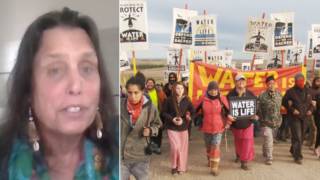
Guests
- Bill McKibbenco-founder and director of 350.org. He is author of Eaarth: Making a Life on a Tough New Planet.
We briefly speak with longtime environmental activist Bill McKibben about his reaction to watching residents of New York City cope with flood waters that turned the Lower East Side neighborhood into an “extension of the East River.” McKibben is the co-founder of 350.org. His latest piece for The Guardian is “Hurricane Sandy Has Drowned the New York I Love.” Click here to see McKibben speak with Democracy Now! on Monday, before the storm, in which he argues, “If there was ever a wake-up call, this is it.” [includes rush transcript]
Transcript
AMY GOODMAN: We are joined by Bill McKibben now, speaking to us from his home in Vermont, co-founder and director of 350.org, author of Eaarth: Making a Life on a Tough New Planet_. Yes, definitely tough. Can you talk now, Bill, after we and”>discussed what was about to happen yesterday, with what has happened with Hurricane Sandra, what many are calling a superstorm?
BILL McKIBBEN: Sure. And first of all, just to say hi to Henia and to Tim, by extension. I’m very glad that he’s out of jail.
Look, people yesterday morning when we were talking were saying this could be an event of historic proportion. And that’s what it turned into, Amy. There were—just sort of scientifically, meteorologically, the storm was completely amazing—the lowest barometric pressures ever recorded north of Cape Hatteras. The storm surge in New York City broke all the records, and the records go back to 1821. It broke them by large margins, just astonishing storm in size. As it came over all that warm water up the East Coast, it just kept growing and deepening. And, of course, by now, everyone has seen the images of what happened in the city, a kind of—kind of horrible sort of vulnerability watching the water pour into subway tunnels, watching the Lower East Side turn into a kind of extension of the East River, and, of course, the great joy in watching resilient New Yorkers coping, as well as could possibly be imagined, with a truly amazing situation.
The storm continues inland today. It looks like Pennsylvania is sort of getting the brunt now, having—you know, New Jersey having been walloped as it came ashore. But, you know, as the sun comes up, the images from along the coast, from Long Island—
AMY GOODMAN: Bill, I’m going to have to interrupt you, because we’re coming—
BILL McKIBBEN: —and New Jersey, are really bad.
AMY GOODMAN: Bill, I have to interrupt you because we’re coming to the end of our show. Bill McKibben, speaking to us from Vermont. Also reports blizzard conditions in parts of Appalachia, snow shutting down the interstate in West Virginia and Maryland.












Media Options